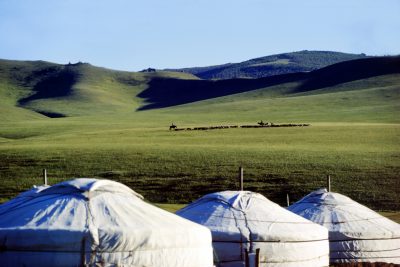Author: Martin Foo, Australian Centre for Financial Studies
In February 1987, a pair of junior American diplomats arrived in pre-democratic Mongolia to lay the groundwork for establishing a US embassy — no simple task in Ulaanbaatar, the world’s coldest capital. When the embassy opened a year later, its American staff resided in a ramshackle apartment building that they nicknamed ‘Faulty Towers‘. Much has changed since then.
Mongolia is now home to Australia’s newest embassy, housed in a modern complex in central Ulaanbaatar, whose skyline today boasts gleaming office towers erected by the nouveau riche.
In late 2015, Australia’s Minister for Foreign Affairs Julie Bishop announced the opening of the Australian embassy in Mongolia — an upgrade of the existing consulate-general — as well as the appointment of career diplomat John Langtry as its first resident ambassador. The opening was welcomed by Mongolia’s president, who considered it a clear gesture of the importance attached by Australia to relations with his country.
The new embassy has been on the cards for at least half a decade. In 2009, a Lowy Institute report recommended opening 20 new foreign missions, including one in Mongolia. The report noted that Australia had a smaller diplomatic footprint than all but a handful of OECD countries. A 2012 bipartisan parliamentary inquiry concurred, identifying a ‘chronic underfunding’ of the Department of Foreign Affairs and Trade (DFAT) over the last three decades, and in a submission to the inquiry DFAT placed a new embassy in Ulaanbaatar near the top of its wish list. Finally, in 2015, Bishopannounced nearly AU$100 million (US$75 million) of funding for the largest expansion of Australia’s overseas network in 40 years.
When Australia and Mongolia first established ties in 1972, officials were reportedly at a loss to describe the exact nature of relations between the two countries. Today, that picture is clearer. Formal exchanges include the Australia Awards program, which has enabled more than 350 Mongolians to study in Australia, as well as the Australian Volunteers for International Development program and New Colombo Plan.
Some 60 Australian companies have offices in Mongolia. And an estimated 200 Australian small and medium-sized enterprises have provided services to the gargantuan Oyu Tolgoi project — a copper and gold mine in the South Gobi desert — with more set to benefit from the completion of a recent financing deal.
More broadly, Australia and Mongolia share many common interests. Both nations are mineral-rich, free-market parliamentary democracies. Mongolia’s ‘third neighbour’ foreign policy sees it cultivate relationships with countries other than the two giants it shares a border with, Russia and China. Mongolia has backed Australia’s bid for a UN Security Council seat and membership in the Asia–Europe Meeting, while Australia has supported Mongolia’s inclusion in international financial organisations and the ASEAN Regional Forum.
Despite these cordial ties, Australia’s new ambassador will have a long list of issues waiting in his in-tray. High on the agenda will be the status of Oyu Tolgoi, which is jointly owned by the government of Mongolia (34 per cent) and Turquoise Hill Resources (66 per cent), a subsidiary of the Anglo-Australian behemoth Rio Tinto. Oyu Tolgoi was once projected to account for a full third of Mongolia’s GDP by 2020, but it has been plagued by disputes over taxation, cost overruns and environmental impact. Resource governance issues will assume heightened political salience in 2016, a parliamentary election year.
The outlook for the economy may also feature on the ambassador’s agenda. Mongolia’s mining sector, which accounts for 81 per cent of the country’s export earnings, has been battered by falling global commodity prices and the slowdown in China. Last year the IMF forecast that the country is at high risk of public debt distress as a result of borrowing to finance public spending and a sharp depreciation of Mongolia’s currency, the tögrög. Meanwhile, millions of livestock face starvationas parts of Mongolia confront extreme winter conditions known locally as ‘dzud’.
Australia may be asked to provide humanitarian support, as it was in 2000 and 2010, in addition to the estimated AU$10.3 million (US$7.7 million) in official development assistance already earmarked for Mongolia for 2015–16. Langtry may need to resist appeals to wield this aid budget as an instrument of leverage. Canada’s Khan Resources recently called on Ottawa to suspend aid to Mongolia in response to its government’s refusal to comply with the terms of an international arbitration award. This echoed similar calls by the American Chamber of Commerce in 2015 to suspend aid talks in protest against the imprisonment of an American mining executive.
The new embassy is a welcome contribution to the recent reversal of a long period of relative decline in Australia’s ambitions abroad. Oyu Tolgoi’s ongoing expansion means that Mongolia’s future will remain inextricably linked with Australian industry. Smart diplomacy now can help to transform the bilateral relationship into one based on complementary national interests.
Martin Foo is a research officer at the Australian Centre for Financial Studies (ACFS). He was formerly a policy analyst at the Australian Treasury. The opinions expressed in this article are the author’s own.
Source:http://www.eastasiaforum.org/









0 comments:
Post a Comment